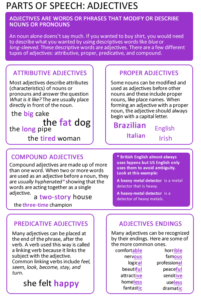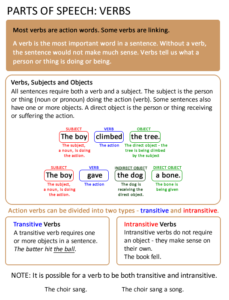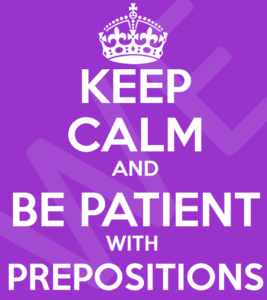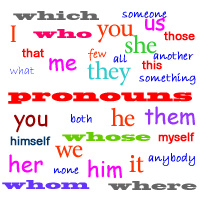Parts of Speech
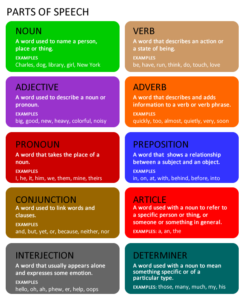
English is made up of many different types of words. We refer to these types of words as parts of speech. Some words can be used in more than one way depending on the sentence they are in.
The main parts of speech are nouns, verbs, adjectives, adverbs, pronouns, prepositions and conjunctions.
Look at the chart below to understand and see some examples of the different parts of speech.
10 PARTS OF SPEECH:
- NOUN – Visit the noun page for more informaiton.
A word used to name a person, place, or thing.
Examples: car, tree, John, New York, dog, table.
- PRONOUN – Visit the pronoun page for more information.
A word that takes the place of a noun.
Examples: I, you, he, it, we, them, mine, theirs
- ADJECTIVE – Visit the adjectives page for more information.
A word used to describe a noun or a pronoun.
Examples: big, red, new, heavy, colorful, noisy
- VERB – Visit the verb page for more information.
A word that describes an action or a state of being.
Examples: be, have, take, run, do, touch, love
- ADVERB – Visit the adverb page for more information.
A word that describes or adds information to a verb, adjective, or other adverb.
Examples: quickly, too, almost, very, soon, quietly.
- PREPOSITION – Visit the preposition page for more information.
A word that shows the relationship between a noun or pronoun and an another word in the clause or sentence.
Examples: in, on, at, with, before, into.
- ARTICLE – Visit the article page for more information.
A word used before a noun to refer to a specific person or thing, or someone or something in general.
Examples: a, an, the
- DETERMINER – Visit the determiner page for more information.
A word used before a noun to indicate something specific or of a particular type.
Examples: those, many, his, my, much
- CONJUNCTION – Visit the conjunction page for more information.
A word used to link words and phrases.
Examples: and, but, yet, or, because, neither, nor
- INTERJECTION – Visit the interjection page for more information.
A word that usually appears alone and expresses some emotion.
Examples: Hello, Ahem, Oh!, Ah!, Excuse me, HELP! Oops!
Permanent link to this article: https://englishyourway.com.br/esl-grammar-guide/parts-of-speech/
A noun alone doesn’t say much. If you wanted to buy shirt, you would need to describe what you wanted by using descriptive words like blue or long-sleeved. These descriptive words are adjectives. There are a few different types of adjectives: attributive, proper, predicative, and compound. Attributive Adjectives: Most adjectives describe attributes (characteristics) of nouns …
Types of Adverbs: Adverbs modify verbs, adjectives, or other adverbs, adding details about how, when, where, or to what extent an action is performed. Common categories include: Placement of Adverbs: The placement of adverbs can vary based on what they modify: Formation of Adverbs Many adverbs are formed by adding -ly to an adjective (e.g., …
There are two types of articles in English: Definite and indefinite. Articles are a type of adjective and a type of determiner. They are always used with a noun. Some singular nouns require the use of an article. The definite article The definite article is the and it always comes before a noun (the word …
although – though – even though – despite – in spite of When we want to say something positive and something negative in the same sentence, we can use one of the following forms: Although (though – less formal) and even though have exactly the same meaning and have exactly the same grammatical construction. although …
What is an Interjection? Hi! That’s an interjection. Interjection is a big word that is used to describe a small word. Interjections are short exclamations like Oh! Um, or Ah! They have no real grammatical value but we use them quite often, usually more in speaking than in writing. Here is a list of interjections with meanings and example sentences. …
A NOUN IS A WORD USED TO NAME PEOPLE, ANIMALS, PLACES OR THINGS Nouns are often called “naming” words. Every sentence must have at least one noun or pronoun. Most nouns can be either singular or plural, and can be divided into two main groups: common and proper nouns. Common Nouns Common nouns are used …
Prepositions Prepositions are used in many different ways in English – perhaps that’s why a lot of people have problems with them. “Monsters!” “Where?” “Behind you!” Prepositions tell us where or when something is in relation to something else. When monsters are approaching, it’s good to have these special words to tell us where those …
Are pronouns just nouns that have turned professional? Of course not! Learn all about pronouns in our new pronoun lesson – you won’t believe how useful they are. Pronouns The word pronoun means ‘for a noun’, and a pronoun is a word that takes the place of a noun. If we didn’t have pronouns, we’d …
Parts of Speech: Verbs Most verbs are action words. Some are linking. A verb is the most important word in a sentence. Without the verb, the sentence wouldn’t make much sense. The verb tells us what the subject (person or thing) is doing or being. Verbs, Subjects, and Objects All sentences require both a subject …
The passive voice is a grammatical construction where the subject of a sentence is the recipient of the action rather than the doer. In other words, the focus is on what is being done to the subject rather than who is doing it. The passive voice is formed by using a form of the verb …


